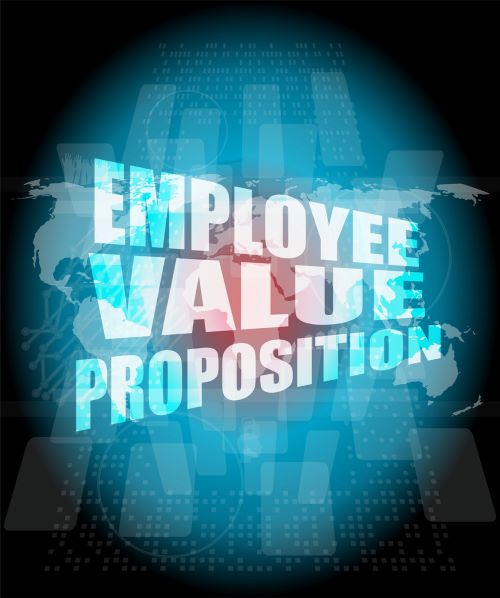What is an EVP?
An employee value proposition (EVP) focuses on the benefits a company offers employees in return for their skills, experience, and qualities they bring to the position. An EVP is a robust recruitment and employee engagement tool. But it can also be more than that. EVPs are a brand’s beacon, and the best EVPs are an authentic representation of the company’s values. It is the single commitment that a company makes to the employees that ensure they will continue to deliver on your brand’s promise despite hardships.
The company EVP includes benefits, financial rewards, career development opportunities, and additional perks employees receive. It also contains the values and visions of the company. The goal of an EVP is to make employees excited and proud to work for an organization. The EVP is owned by the Human Resource department and embodies the total employee experience. The policies, processes, and programs demonstrate the organization’s commitment to employees’ well-being, skill development, and each employee’s overall goals. EVPs consider that employees are driven and motivated by different strategies, methodologies, and behaviors.
While many organizations may falsely believe that employees are looking for career advancement and pay advances, this may not drive all workers. Some workers seek fulfillment to make a greater impact in the world. Others may wish to know that their skills have special and unique value whether they are in leadership and so forth. And yet others may be motivated by being challenged to solve complex problems, opportunities for holistic life-in-balance, work flexibility, etc.
Job seekers search for companies that have like values. If they see an employee value proposition that aligns with their goals and passions, they may choose one organization simply because of an EVP. In a survey by Indeed, 21% of people looking for jobs decided to accept an offer for their current position because their interests and values were reflected in its mission. (1)
Doing due diligence, job seekers carefully consider where they want to work, desire fulfilling work with growth opportunities, seek an organization’s commitment to personal wellness, recognition, rewards, and assurance that employers care about them. Through the EVP, companies can communicate how their organization will meet these expectations, helping them stand out from competing employers to attract qualified (and top) talent. (2)
EVPs are to employees what unique selling propositions (USPs) are to prospects that become loyal, repeat, and referring customers.
Why are EVPs now coming to the front again?
EVP is the phrase used to describe why someone should work ‘here’ versus somewhere else. EVPs explain how a company can attract new employees and retain the ones that are already employed. However, it is articulated, expressed, or managed; every organization has some EVP, even if it is unwritten. It is the employee’s promise.
The actions taken by businesses in reaction to the COVID-19 pandemic, for example, are reflected and remembered in the firm’s EVP. It will be retained if the company takes steps to protect jobs and the health of its employees. A lot of the decisions companies made during the peak of the pandemic were financially based. However, now peri-covid, it is time to look at the EVP to see if the company is positioned accurately and well. (3)
Now more than ever, employee needs are paramount. The health and safety of employees are primary concerns. A new flexible approach to work and compensation is needed. Leadership teams in companies need to show that they prioritize employee needs in their decision-making.
This recognition, in turn, will translate into attracting top talent who want to deliver for the company and its customers.
When employers and employees align on purpose, it helps develop and propagate company values, which in the long run helps build the company brand, promotes productivity and efficiency. Overall profitability will follow. (4)
An example of a Post-COVID EVP
The aspects of what employees value in their work, and the factors they prioritize in career decisions, have shifted. The EVP needs to evolve with them. An organization’s EVP may include elements that became irrelevant once COVID-19 entered our world. Such benefits as social events, gym memberships, or magnificent office spaces may no longer be things companies can promote as they no longer have the value or enticement they once did.
Of companies surveyed, 53% said they’re altering their EVPs to promote work-life balance and wellness so that employees don’t feel they have to grovel, work harder than usual, or take on grub work in exchange for remote work assignments. This trend of work-life balance is worth jumping on to since we all need to be more aware than ever of our wellness.
Companies once could offer quirky well-being benefits that may only interest a few, but post-COVID benefits need to add real value to the lives of their employees. (5) Remote work options, for example, need to be integrated into most jobs. More flexibility for personal time off, including caring for dependent loved ones such as elderly parents, children, significant others, etc., are benefits that should be factored into EVPs. Mental health, especially during times of high stress (such as during a pandemic, regional or world crisis, etc.), intervention and awareness also should be part of these benefits so that no one takes on too much or suffers in silence. Motivation, morale, and incentive-boosting programs to encourage and recognize employees need to be vital to any EVP strategy.
Discover more inspiring ideas for exciting experiences that boost morale and engage your people. Contact Gavel International for details.
_____________________________________
SOURCES:
- https://www.indeed.com/hire/c/info/employee-value-proposition
- https://www.randstadrisesmart.com/blog/why-every-company-needs-strong-employee-value-proposition
- https://insights.humancapital.aon.com/talent-assessment-blog/what-if-employee-value-proposition-becomes-important-again
- https://www.thehrdigest.com/employer-branding-and-talent-attraction-in-a-post-covid-world/
- https://www.gem.com/blog/is-your-evp-still-relevant-in-a-post-covid-world
This article was last updated on November 23, 2022
- Why Content Is Essential for Driving Leads – and How to Create Content That Does - March 3, 2025
- Branding vs. SEO: Striking the Perfect Balance - February 10, 2025
- Why Executive Retreats Are Worth the Investment - January 6, 2025






